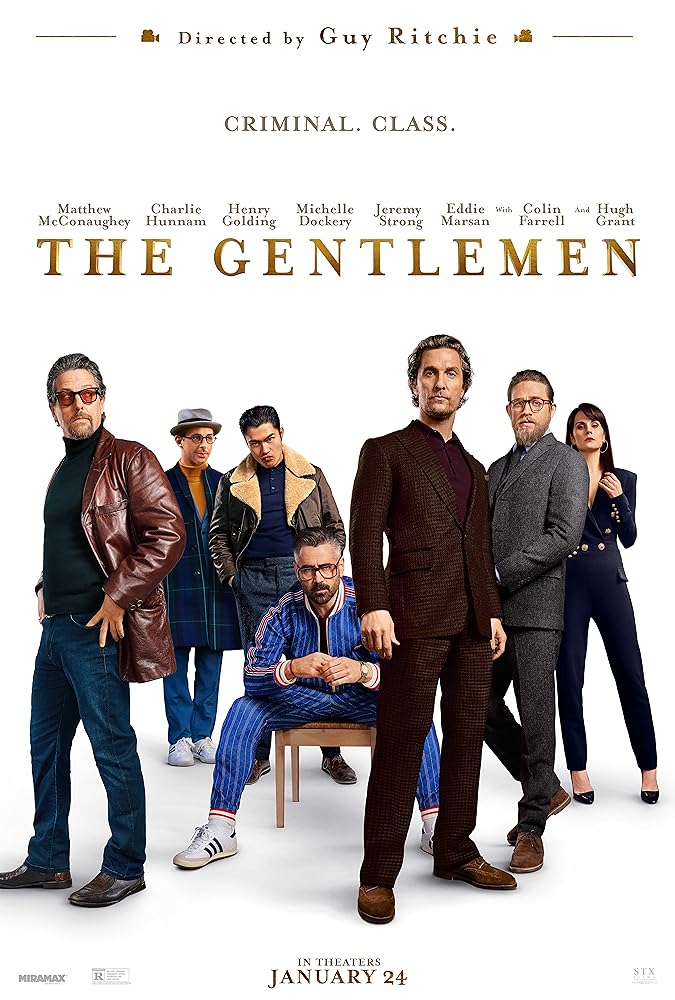
Guy Ritchie is an auteur in
the truest sense of the word in that he seems to be only good at making one specific
kind of movie. Anyone who’s seen Swept Away, King Arthur: Legend of the Sword
or Aladdin
can attest to that, but anyone who’s seen Lock, Stock and Two Smoking
Barrels, Snatch, RocknRolla, Sherlock Holmes and The Man from U.N.C.L.E.
will tell you that’s not necessarily a bad thing. Ritchie has made an
effort to branch off from the gritty British gangster flicks that he built his
name on, but after failing to get a King Arthur cinematic universe off the
ground and having all of his edges sanded off by Disney, The Gentlemen
sees him returning to his roots and doing what he does best. Does this make him
a one trick pony? Perhaps, but is there really anything wrong with being a one
trick pony if you’re really good at your one trick?
Our story follows Mickey
Pearson (Matthew McConaughey), an American ex-patriot in England who’s grown his
own crime empire from the ground up with a series of marijuana farms. Mickey
plans on retiring early, selling it all to the highest bidder and settling down
with his wife, Rosalind (Michelle Dockery). He’s this close to closing the deal,
but a series of attempts to undermine him, mainly from a young Chinese mob boss
(Henry Golding) and a Jewish billionaire (Jeremy Strong), force Mickey to
assert his dominance as king of the jungle. Meanwhile, a sleazy journalist (Hugh
Grant) who’s been investigating Mickey’s operation attempts to blackmail his
enforcer Raymond (Charlie Hunnam) for information in exchange for a screenplay
based on his findings.
Most of the building blocks
that made up Guy Ritchie’s early body of work are all present and accounted for
in The Gentlemen: A large cast of colorful, sharply dressed characters, London’s
seedy underground as the setting, multiple non-linear plots that cross paths in
increasingly convoluted ways, quippy dialogue delivered at breakneck speed,
over-the-top violence meshed with absurdist humor, quick and frenetic editing,
the whole nine yards. The big turnaround this time that there’s an air of
reflection in the screenplay. Much like how Once
Upon A Time in Hollywood and The
Irishman saw Quentin Tarantino and Martin Scorsese reflecting on their respective
legacies and their effect on a changing landscape passing them by, The
Gentlemen sees Guy Ritchie looking back fondly on his previous work. And
while the plot revolving a suave crime lord asserting his dominance before
retirement lays the metaphor on a bit thick, Ritchie is more concerned with
having fun while playing the toybox. This movie is far more occupied with self-aggrandizing
than self-critique.
This is both a good and bad
thing. For those who were raised on his particular brand of British crime
thriller juvenilia, this back to basics approach should be an easy layup, but probably
won’t do much to convert the uninitiated. It’s pretty easy to see watching Lock,
Stock and Two Smoking Barrels, Snatch, RocknRolla and this that he’s
working with the same blueprint, but it’s one he keeps leaning back on it
because it works. But even a well-oiled machine needs an occasional upgrade.
While Ritchie’s frenetically paced filmmaking has aged pretty well since the
early 2000’s, his social politics haven’t. Granted, Ritchie was never really a
bastion of progressiveness, but there is some politically incorrect racially
charged humor peppered throughout, particularly aimed at Jewish and Chinese
people, that wouldn’t have fit in well even back then, especially in one
particular scene where it’s exploited for cheap shock value. It gets pretty
tiresome, but the movie moves at such a fast pace that it’s all shrugged off
before the audience even gets a chance to be offended, and the rest of the
action is so well executed that it’s easy to overlook.
On that note, it’s the cast
that makes it all worthwhile. Guy Ritchie has always been great with ensemble
casts and this is easily the most impressive lineup he’s assembled since Snatch.
Matthew McConaughey isn’t the kind of actor you’d peg to play an American
Scarface in London, but he makes it work. Michelle Dockery makes her presence
known in the normally male-dominated Ritchie ensemble as McConaughey’s equally
unflappable wife. Colin Farrell makes a remarkable late appearance as an MMA
coach leading a squad of wayward youths who unwittingly get him roped into the
caper, but he turns out to be better adept at it than he thought he would. The
true standouts, of course, are Hugh Grant and Charlie Hunnam as our narrators.
Grant especially makes a revelatory turn as this sleazy, impish, conniving
yellow journalist who isn’t above twisting the truth and digging up dirt for a
scoop. Considering Grant’s decades-long war with the press, it feels like he’s
been channeling all of that animosity into this one role. Hunnam’s turn as
Raymond is the complete opposite: Mild-mannered, smartly dressed, understated, always
in control even when there are bullets flying and bodies falling from balconies.
The story within a story is Fletcher pitching his screenplay while waiting to
spring his big gotcha moment to rope Raymond into his grift, with Raymond
calmly correcting his exaggerations and discreetly disarming his traps before
they set off.
Bottom line, The Gentlemen
is Guy Ritchie doing what he does best. Not everything about it works 100%, the
script does seem a little too satisfied with its own cleverness at time, and
some of its more politically incorrect moments are a bit iffy, but the
performances are engaging, it has all the same energy that made Ritchie so beloved
in the first place, and it has everything you come to expect from this director
working with this cast in this setting and doesn’t pretend to be anything else.
Ritchie has nothing to prove at this point, let him play in the sandbox.
7/10
No comments:
Post a Comment